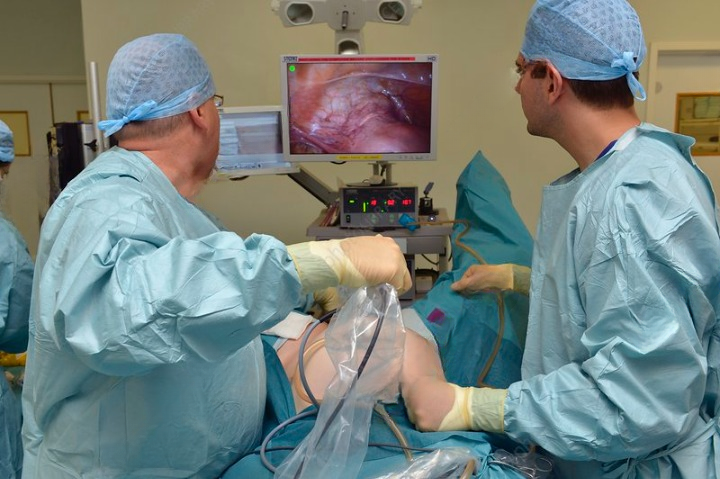Laparoscopic Hysterectomy

What is Laparoscopic Hysterectomy?
Laparoscopic hysterectomy is a minimally invasive surgical procedure in which the uterus is removed using fine instruments inserted through small incisions in the abdomen while monitoring the procedure with a laparoscope. This technique is less risky than traditional surgery and is preferred due to its quick recovery time, shorter operation duration, and reduced recovery period.
Is Laparoscopic Hysterectomy Dangerous?
Like any surgical procedure, laparoscopic hysterectomy may be associated with some complications or side effects, such as:
Fatigue.
Bleeding.
Infection at the incision site.
However, the likelihood of these complications is very low, especially when the procedure is performed by Dr. Ayman Taher, as laparoscopic surgeries offer higher safety, faster recovery, and fewer complications compared to open surgery.
Reasons for Hysterectomy
Hysterectomy is performed to treat serious or chronic health conditions. The most common reasons include:
Cancer: Affecting the uterus, cervix, endometrium, or ovaries.
Uterine Fibroids: Which may cause severe bleeding or intense pain in some cases.
Endometriosis: When tissue similar to the uterine lining grows outside the uterus, causing bleeding and severe pain, making hysterectomy the only viable solution.
Chronic Pelvic Pain: When other treatment methods have failed.
Uterine Prolapse: When the uterus shifts from its natural position, putting excessive pressure on the bladder or intestines, leading to significant health issues.
Success Rate of Laparoscopic Hysterectomy
The success rate of laparoscopic hysterectomy exceeds 95%, making it a safer option compared to open surgery, as it minimizes the risk of complications.
The success of the procedure depends on the patient’s health condition, the reason for the surgery, and the surgeon’s expertise. When performed by Dr. Ayman Taher, you can be completely confident in the success of the operation.
Post-Hysterectomy Symptoms
After the procedure, the patient may experience some side effects, including:
Abdominal or pelvic pain.
Constipation (usually temporary).
Light vaginal bleeding.
Fatigue and exhaustion.
Mood swings.
Menopause symptoms.
Post-Hysterectomy Care Instructions
Following Dr. Ayman Taher’s instructions before and after the surgery is essential for a smooth recovery. Key recommendations include:
Avoiding any strenuous activities.
Using sanitary pads in case of vaginal discharge or light bleeding.
Avoiding heavy lifting.
Refraining from intercourse for at least 6 weeks.
Not driving until all symptoms subside.
Ensuring complete rest.


